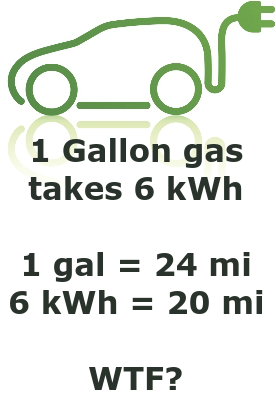Just so you don't think I forgot about you

...
I was able to 2x-3x check my numbers last night, but I have not had time to put them in as concise and clear a presentation format as I would like. Hopefully later today, but I do have some much higher priority personal stuff going on, so please bear with me.
But to not leave you hanging, I'll provide the gist of it, and detail the numbers later (the numbers themselves are fairly straightforward, the explanations of them is what I'm working on). But after reading through the link you gave, I actually got confused if you were trying to
support the claim that 6 kWh of electricity is used to refine a gallon of gas, and that can propel an EV about as far as the gas would propel an ICE, or if you were trying to
counter it, and use it as an example of
'you can find support for any view'... The whole “WTF?” part comes across as pretty snarky and superior, unless I'm misreading that as well.
But since you said (bold mine):
There is most certainly electricity used to run refineries and distribute gasoline, that largely offsets the electricity used to charge EVs.
I'll go with the 'support' angle.
It is pretty easy to
disprove the statement, and I'm saddened/disappointed that someone as brilliant and respected as Elon Musk is repeating a statement that is clearly rubbish, and misleads (either purposely, or through ignorance/inattentiveness) the public on these important topics. And that leads to “appeal to authority” false arguments all over the Internet. And Elon clearly assigns this to "refining" in the links (though they mostly talked about a 5 kWh figure, not 6, but close).
Bottom line, as I expected, there simply isn't enough electricity generated in the US to support the claim. That claim results in a Terawatt-hour figure that exceeds ALL the electricity allocated to ALL industrial processes combined (or about 25% of total electrical generation). Simply not rational. You can try to break down numbers and energy assignments any way you want, but that much electricity simply cannot be accounted for.
Now, trying to get an accurate figure is really getting into the weeds, but it is clear that the 6 kWh figure is way overstated. To dig deeper, you get into complications such as:
Hmmm, aren't some of the byproducts of refining sent to power plants to generate electricity? How to account for that?
What is the electrical energy delta between a hybrid and an EV (lithium battery production for example), amortized over their useful lives?
And probably many more. But I'll get the 6 kWh numbers posted later.
STAYING ON TOPIC: Yes, this still gets back to the thread topic - if we are looking to VW for compensatory payments (separate from 'fines') for the excess NOx their non-compliant vehicles emit, isn't it reasonable to look to EVs and understand how much NOx and SOx they are responsible for, and shouldn't they have to pay to reduce these pollutants, in the same way that we pay for the pollution controls on our non-EV cars?
Which brings me to another point I repeatedly make. A “gate” is just a bad way to manage things. Emissions should not be pass/fail (samclem touched on this), but a car maker could have to pay for X level of emissions. The lower they are, the less they pay, the more popular the car could be (depending on costs to lower emissions). It would motivate further reductions and cost effectiveness beyond the 'gate', and reward small, efficient cars over larger ones that simply 'pass'. And heavy emissions could be so expensive, there would be virtually no vehicles like that on the road. In this case, averages
do count.
Imagine if adding another $10 of equipment lowered emissions another 20% beyond the pass/fail level. Today, a manufacturer would not spend the $10 - they passed, and that's all they care about.
-ERD50


